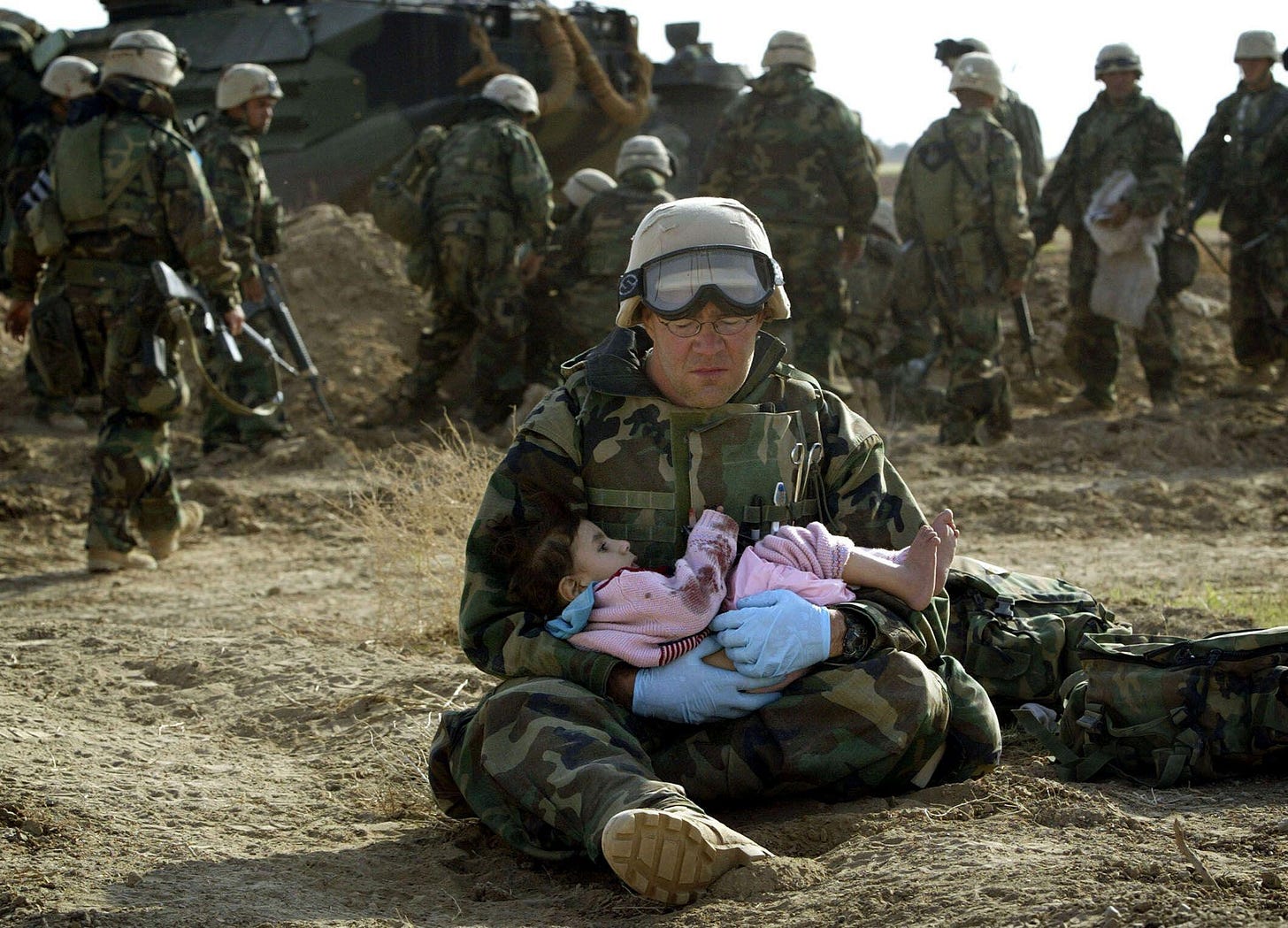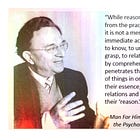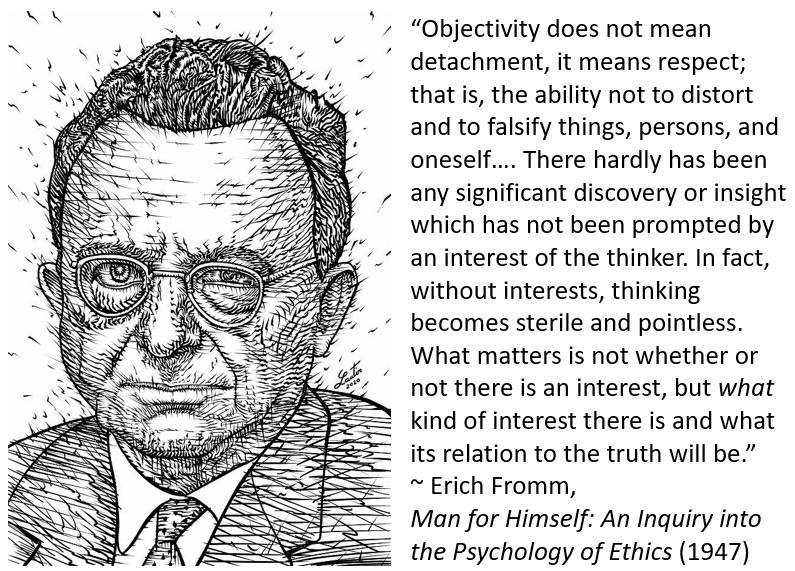The Bomber and the Bombed
Objectivity, Values, and the Failure to Acknowledge the Civilian Death Toll from the Invasion of Iraq. Part II of Media Omissions on the 20th Anniversary of the Iraq War
What does it mean to us that tens of thousands of civilians died during the Iraq War? What insight or wisdom can we derive from such statistical assertions? To fully grasp the reality and significance of so many people dying—and why else should we turn to the “news”—we need to know something about the organizations, individuals, and actions responsible for causing their deaths. To the extent that we love life, no question can be more important than how and why a dignified being endowed with intrinsic value—a person—was deprived of existence.
We too often overlook the way in which value based judgments are inherent in even the most mundane of intellectual activities, including routine reporting of the news. This fact is obscured by the apparent absence of explicit statements of value in much of our media discourse. News reports on the 20th anniversary of the Iraq War did not directly state one or another ethical principle. Reporters simply presented the facts. But the choices made about what facts are highlighted, how much space is devoted to discussing the various experience of those in a given war—the politicians, generals, soldiers, civilians—are shaped by undisclosed values and judgments.
The concentration on one fact over another is itself a value based judgment about what is most important. As the public intellectual and historian Howard Zinn put it,
“there is no such thing as a pure fact, innocent of interpretation. Behind every fact presented to the world—by a teacher, a writer, anyone—is a judgment. The judgment that has been made is that this fact is important, and that other facts are not important and so they are omitted from the presentation.”
But these value-laden choices are rendered invisible by common sense, the culturally dominant set of beliefs, ideas, and presumptions through which we filter our experiences. Philosopher Kerry Walters describes the epistemological situation we thinking beings find ourselves in this way:
“The knowing subject is not a passive spectator who simply receives information that is anonymously processed in a formalistic black box. Instead, she brings to the act of knowing a complex set of presuppositions and commitments, and this set necessarily informs the type of information she concentrates on as well as the inflections she places on it.”
Human beings can no more think in a “pure,” “untainted,” or “desubjectified” manner than an artist can paint without a basic sense of color, shape, or texture. We inevitably view the world through a lens or conceptual framework—a schema or worldview—made up of experiences, cultural presumptions, values, and attitudes. By recognizing the influence of such factors we can develop the necessary self-awareness enabling genuine open-minded, critical, and rational thought.
Too often objectivity is mistakenly understood as detachment and care-less thought. In Man for Himself: An Inquiry into the Psychology of Ethics: An Inquiry Into the Psychology of Ethics (1947), Erich Fromm explained the folly of such a conception.
“Objectivity does not mean detachment, it means respect; that is, the ability not to distort and to falsify things, persons, and oneself…. There hardly has been any significant discovery or insight which has not been prompted by an interest of the thinker. In fact, without interests, thinking becomes sterile and pointless. What matters is not whether or not there is an interest, but what kind of interest there is and what its relation to the truth will be.”
The aim of objective, reasoned inquiry is nothing short of recognizing the underlying realities of human existence, beneath veiled surfaces. Yet such thought requires interest in whatever we are examining.
Objectivity is better understood as fair-mindness, an approach to making sense of the world by considering ideas, issues, or facts from multiple vantage points instead of privileging the view we “instinctively” favor or feel most comfortable with. Objective thought also requires self-awareness in place of egocentrism and self-delusion. “Objectivity requires not only seeing the object as it is,” wrote Fromm, “but also seeing oneself as one is, i.e., being aware of the particular constellation in which one finds oneself as an observer related to the object of observation.” We fail to think objectively when we view the world through the egocentric or ethnocentric monocle, failing to ask how we are viewed from the other end of the lens.
To think objectively is to consistently recall the limits of relying on our own cultural common sense. “Although the subject is always an active participant in the process of thinking,” writes Walters, “she is nonetheless capable of recognizing her own predilections and thereby preventing them from imperialistically absorbing alternative ones.” In place of visions of God-like neutrality or inhumanly purity of perspective, objectivity is understood as self-awareness and intellectual humility. To think objectively we seek out or think up a range of views that conflict with our own assumptions, beliefs, and experiences to scrutinize.
In reporting on a war this means remembering that we cannot understand an aerial bombardment from the sky and the military installations launching rockets, alone. We will need to either gain access to the experiences of those on the other end of these munitions, or at least inform our public of the narrowness and inadequacies of our presentation of facts.
The Bomber and the Bombed
The importance of bringing together starkly different vantage points was made clear in a unique NPR story (March 24, 2023) featuring a discussion between someone involved in dropping bombs and someone experiencing that bombing from the ground. The program brought together Steve Ankerstar, a major in the U.S. Air Force during the Iraq War, and Shaymaa Khalil, who was a teenager living in Baghdad at the time of the invasion. Ankerstar participated in the "Shock and Awe" aerial bombardment, dropping bombs on two targets in Baghdad with his Nighthawk stealth fighter jet. Khalil was living with her family in a four story residential building near government buildings.
In the dialogue, Khalil asked Ankerstar about his bombing targets. She wanted to know how he knew there would be no civilians near his bombing targets. Ankerstar answered that he targeted a command center and a command bunker but he avoided Khalil’s question about civilians like herself. Ankerstar said he assumed that the facilities he attacked were operational. “And I would assume that, of course, if they’re operational there's going to be people in them.”
Ankerstar in turn asked Khalil about what it was like to be on the other end of the bombs. “I will never forget that night,” Khalil said, “because we were living in a place surrounded by different government buildings so there is like many bombings close to our area.” Khalil’s parents tried to keep her calm as they joined a throng of Iraqis seeking safety outside of their home. With limited options to stay safe, the family went to a nearby park huddled together on the ground. “We tried to close our eyes, close our ears,” Khalil explained. “When the bombing happens, I remembered I lost hearing for 10 minutes or 15 minutes.” The exchange of radically distinct experiences and perspectives was as enlightening as it is rare in mainstream media.
The routine omission of vantage points like Khalil’s—her terror and indignation—reveal the ethnocentric bias of mainstream news media coverage of war and peace. Some would have us believe that such accounts distract us from the facts with unproductive and emotionally influenced information. This is precisely the distorted vision of objectivity, as the “view from nowhere,” that disguises the partiality and value based preferences of dominant culture as expressed in mainstream news media and political discourse.
When a set of values or norms are culturally ubiquitous they can and often do go unsaid. But that does not mean they are not active in shaping the selection and sense-making of information. The benefit, to those favoring the dominant value-based norms, is that they need not explicitly state their values. (And if they do, they are so taken for granted as to hardly be questioned.) These alleviates them of having to defend their value-based ideas against charges of being “political,” “emotional,” and/or “moralizing.”
When a cultural group’s values are rendered common sensical, they are treated as benign, unperturbable statements of reality: obvious and in need of no defense. As the Australian ecofeminist philosopher Val Plumwood explained, detaching sets of ideas or beliefs from the care or values that underly them cloaks “privileged perspectives as universal and impartial.” The attending result is that ideas or beliefs outside of the dominant ideology “as ‘emotional,’ ‘biased’ and ‘political.’”
“The ‘value-free’ stance will normally be taken to involve accepting the effects of power, since the powerful have the advantage of inertia, whereas the oppressed must act to disrupt the status quo from a passion for change. The demand for disengagement thus tends to favour the perspectives of the powerful, who have only to announce the realities created by power and to employ the well-practiced conceptual and emotional distancing mechanisms which legitimate the exploitation of the objectified and oppressed.”
What’s Left Out
The challenge of recognizing mainstream news coverage’s partiality, as it masquerades as “objective,” is that we often lack vital details to contextualize this reporting. We do not know that some facts are emphasized while others, perhaps unknown to the insulated writer, are omitted. Consider how very few news reports—on the 20th anniversary or any others before 2023—have ever included detailed breakdown of how many Iraqi civilians died as a direct result of U.S. munitions.
Researchers with Iraq Body Count have determined that nearly 24,865 Iraqi civilians were killed in the first two years of the war alone, from March 2003 to March 2005. Another 42,500 civilians were injured during this time. For contrast, the United Nations estimates that the Russian invasion of Ukraine caused 8,006 deaths and 13,287 injuries in the opening year of the war.

Given the ethically appropriate concern expressed after nearly 3,000 innocent people were destroyed on September 11, 2001, we might expect significant concern over reports that women and children constituted 20-percent of the civilian deaths—almost 5,000—in the first two years of the Iraq War.
U.S.-led forces are believed to have been directly responsible for killing 9,000 of those 24,865 civilians. The most common identified cause of death perpetrated by U.S. and coalition forces was airstrike. Coalition forces are believed to have killed 6,616 Iraqi civilians in just 21 days, between March 20 and April 9, 2003. The U.S. was responsible for nearly 99% of the killings committed by the U.S. led coalition. A media organization embracing genuine impartial interest in the facts and a non-biased respect for human life would treat such information as newsworthy and vital to communicate to an American public responsible for electing those who make decisions about military policy.
Many of the civilian deaths caused by U.S. munitions and forces occurred during the “Shock and awe” aerial bombardment of the densely populated urban center of Baghdad. Such deaths were precisely those that concerned senator Paul Wellstone. During the 2002 Senate hearing on Iraq, Wellstone noted that the Bush administration’s plan for invading Iraq itself failed to even discuss the impact of bombing the city would have on civilian deaths.
"The most recent leaked military plan for invading Iraq calls for a heavy reliance on air strikes, focusing first and primarily on Baghdad. What is never mentioned in this report is the fact that Baghdad is also a crowded city of four to five million people, and it would be virtually impossible to take measures sufficient to prevent innocent non-combatants from being harmed."
Wellstone’s colleagues in the Senate including nearly all of the Republicans and leading Democrats such as Joe Biden, Hillary Clinton, Dianne Feinstein, and Chuck Schumer failed to express a comparable ethical concern about the lethality of invading Iraq. This moral apathy, if not outright indifference, toward likely civilian deaths is what inspired Cornel West to provocatively insist, in his July 2023 interview with Anderson Cooper on CNN, that Russia was not the only nation and military capable of unleashing indefensible destruction if left unchecked. That so many including Cooper himself found the comparison unfathomable and irrational only proves how little we know about the Iraq War and the death and devastation it wrought.
Read part III below
If you enjoyed this post please share it with others and like it by clicking the heart icon. Be sure to subscribe if you haven’t already.
Invite Dr. Nall to Speak
Dr. Nall delivers energetic live presentations and engaging workshops on the subjects featured in Humanities in Revolt. Those interested in booking a workshop or talk can get in touch through Facebook or by leaving a comment.









